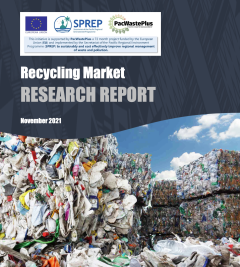
Small island nations face many logistic and financial barriers in attempts to increase local recycling rates. The exportation of recycled material presents a range of benefits for nations with the inability to dispose of or reuse waste in an environmentally beneficial manner. This could be due to a shortage of landfill capacity on-island, the risk of hazardous chemical pollution, or the lack of primary industries.
To understand the potential opportunities and barriers for Pacific Island Countries (PICs) and Timor-Leste to export waste and recycling to international markets, this report from the PacWastePlus programme, and implemented by the Secretariat of the Pacific Regional Environment Programme (SPREP), includes:
-
A legislative review to understand regulatory barriers to accessing recycling markets and to determine the most viable export destinations.
-
A high-level cost model to calculate the viable tonnage for commodification based on the identified market destinations.
-
Recommendations for PICs made based on the cost-model results combined with a high-level infrastructure gap analysis of existing PIC resources.
The review covers six major waste streams - absestos, hazardous wastes, tires, e-waste, plastics and metals - identified as having potential for export commodification, or are seen as having essential transport requirements due to the lack of disposal capacity on island nations.
A summary booklet detailing the main findings of the report can be found here, or the full report can be downloaded below.
